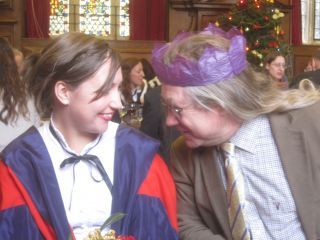Grief
Not Leaving Recovery 'Til It's Too Late
One more reason not to defer making changes to your life.
Updated October 24, 2023
Two weeks ago my father died unexpectedly. He was 58, and although he had a heart condition, no one had thought he would die so soon. He died abroad, after a happy evening spent in Amsterdam, and in the midst of peaceful sleep, and he was found in the morning 'with no frown on his face'. The knowledge that he felt no pain and no fear as he died is a great comfort in the family's grief.
For me there is a second great comfort: the fact that I recovered from anorexia in time to be his daughter again for nearly three years before he died. During the decade of my illness we grew more and more estranged, neither understanding the other, each fearing the other. He was so full of life, he loved being in the world so very much, he loved having experiences and sharing them with others so much, that being confronted with the shadow of a daughter, whom he could no longer nourish and look after, who removed herself from the world into a dark space of hunger, obsession, and secrecy, was heart-breaking and incomprehensible to him (as to so many others).
I shall never forget the beautiful simplicity with which he welcomed me back into the world—into his world—as I began to eat again, this time for good. We went to a restaurant in Oxford and had steak and chips and red wine—the first steak I'd eaten for fifteen years or more—and he wept with happiness. It was as though he'd been waiting all those years for me to realise that this was what I'd wanted too. There was no need for him even to forgive, now that his patience had been rewarded. It was almost as though that long decade had never been.
Since then we have been father and daughter again, or daddy and little girl. We've eaten, drunk, and laughed together again, he's hugged me again without feeling the sickening fragility of the starved person who doesn't really hug back, he's been able to be proud of me not just for my academic achievements but for my life. Now we shall never share any of that again, but at least we did have those few years, to make him happy while he lived, and to sweeten my memories now he has died.

I think occasionally and with horror at how it would have been if he'd died four years ago, or if I hadn't made that difficult but very simple decision three-and-a-half years ago. My mind shies away from the life-long pain I would have felt then: the searing regret, the agony of knowing that he had died thinking me lost to him, died thinking that he had failed as a father, died worried and saddened and scared of me as he was for so long.
Instead he died knowing I loved him, and loving me; he died confident in the knowledge that I would never go back because I'd fully recognised the complete hollowness of all anorexia's promises; he died quite sure that he had been a good father and that his daughter was healthy again in body and mind.
I write this so that those of you who read this and who are still ill might reflect on how fragile life is—not only your own, but the life in those who love you, even in those who brought you into the world. It's so easy to assume that one has all the time in the world to make changes, but a heart can stop in seconds, and then it's all too late, and there's only regret left. I thank the universe and everything in me that allowed me to come back to life before my father died.


